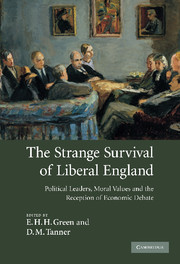 The Strange Survival of Liberal England
The Strange Survival of Liberal England Book contents
- Frontmatter
- Contents
- Acknowledgements
- List of abbreviations
- List of contributors
- Introduction
- Part I Economic ideas and political leaders
- 1 Utilitarian or Neo-Foxite Whig? Robert Lowe as Chancellor of the Exchequer
- 2 Political economy, the labour movement and the minimum wage, 1880–1914
- 3 Economic interpretations of war: American liberals and US entry into World War I
- 4 Political leadership, intellectual debate and economic policy during the second Labour government, 1929–1931
- Part II The use and abuse of economic ideas: Keynes and his interpreters
- Part III Economic forces and their significance
- Index
3 - Economic interpretations of war: American liberals and US entry into World War I
Published online by Cambridge University Press: 04 July 2009
- Frontmatter
- Contents
- Acknowledgements
- List of abbreviations
- List of contributors
- Introduction
- Part I Economic ideas and political leaders
- 1 Utilitarian or Neo-Foxite Whig? Robert Lowe as Chancellor of the Exchequer
- 2 Political economy, the labour movement and the minimum wage, 1880–1914
- 3 Economic interpretations of war: American liberals and US entry into World War I
- 4 Political leadership, intellectual debate and economic policy during the second Labour government, 1929–1931
- Part II The use and abuse of economic ideas: Keynes and his interpreters
- Part III Economic forces and their significance
- Index
Summary
‘Do you want to know the cause of war?’, Henry Ford asked newspapermen in 1915. ‘It is capitalism, greed, the dirty hunger for dollars.’ In this instance, as more generally, Ford can hardly be seen as a typical American businessman. At the time he delivered this judgement, he was chartering a ‘peace ship’ in an effort to mediate an end to the European war. Nevertheless, his comment reflects the wide currency in the United States of an economic interpretation of the causes of World War I. Ford's peace venture had brought him into contact with radical activists in the peace movement and it may well have been to these that he owed his diagnosis of the root of the trouble. An economic interpretation of all political phenomena was, of course, axiomatic for socialists in the Marxist tradition. But with respect to international conflict such an approach was common among a much wider spectrum of American progressives and reformers. In common with related ideas derived from English liberal circles, it helped to shape the view of the European war and of the elements of a lasting peace adopted by President Woodrow Wilson during the period of American neutrality. However, when Wilson led the United States into the war in response to the German submarine campaign, it was progressive opponents of this intervention who attributed it to economic interests. This interpretation gained wider currency in the inter-war period, laying the basis for the neutrality laws of the 1930s, but was discredited thereafter.
- Type
- Chapter
- Information
- The Strange Survival of Liberal EnglandPolitical Leaders, Moral Values and the Reception of Economic Debate, pp. 89 - 112Publisher: Cambridge University PressPrint publication year: 2007
